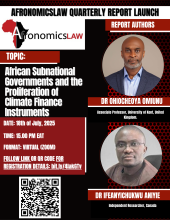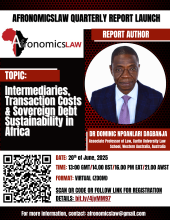Afronomicslaw Sovereign Debt Quarterly Brief, No. 6 of 2025: African Subnational Governments and the Proliferation of Climate Finance Instruments (English & Swahili)
With African non-central governments (NCGs) (i.e., sub-states, regions, cities, municipalities, local governments, etc.) increasingly vulnerable to climate induced impacts, there is a pressing need for local adaptation and mitigation financing that aligns with both environmental and socio-economic priorities. This need has precipitated a shift towards climate finance instruments to meet the funding deficit for local adaptation and mitigation projects at the local level. A case in point is the Tanga UWASA bond, East Africa’s first subnational water infrastructure green bond. Touted as an important step towards local revenue mobilization for green projects from the domestic debt market, this instrument raises critical questions about debt responsibility, the prioritization of bankable projects over community needs, and the risk of financialization of essential public utilities.This study explores whether the Tanga UWASA Green Bond represents true domestic capital mobilization or entrenchment of foreign financial dependence, given its recent listing on the Luxembourg Stock Exchange (LuxSE).

